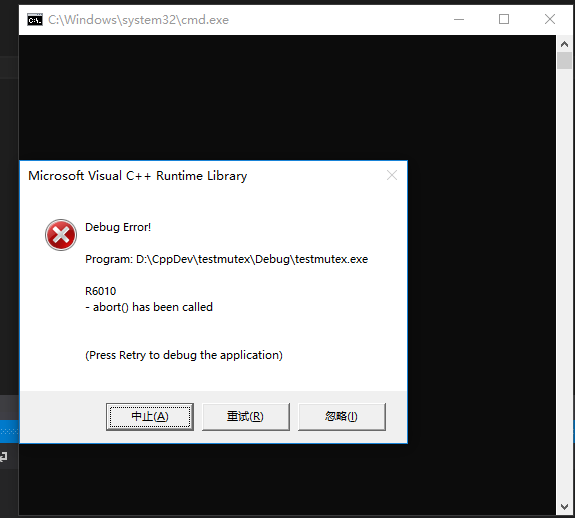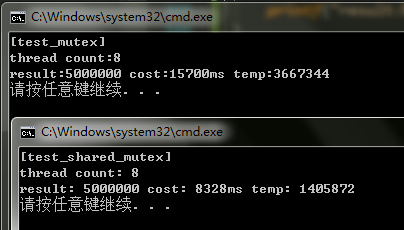 3.7 C++ 11/14/17 线程同步对象
3.7 C++ 11/14/17 线程同步对象
在 C/C++ 语言中直接使用操作系统提供的多线程资源同步 API 虽然功能强大,但毕竟存在诸多限制,且同样的代码却不能同时兼容 Windows 和 Linux 两个平台;再者 C/C++ 这种传统语言的使用份额正在被 Java、python、go 等语言慢慢蚕食,很大一部分原因是 C/C++ 这门编程语言在一些功能上缺少“完备性”,如对线程同步技术的支持,而这些功能在像 Java、python、go 中是标配。因此 C++ 11 标准新加入了很多现代语言标配的东西,其中线程资源同步对象就是其中很重要的一部分。本小节将讨论 C++ 11 标准中新增的用于线程同步的 std::mutex 和 std::condition_variable 对象的用法,有了它们我们就可以写出跨平台的多线程程序了。
# 3.7.1 std::mutex 系列
关于 mutex 的基本概念上文已经介绍过了,这里不再赘述。
C++ 11/14/17 中提供了如下 mutex 系列类型:
| 互斥量 | 版本 | 作用 |
|---|---|---|
| mutex | C++11 | 最基本的互斥量 |
| timed_mutex | C++11 | 有超时机制的互斥量 |
| recursive_mutex | C++11 | 可重入的互斥量 |
| recursive_timed_mutex | C++11 | 结合 timed_mutex 和 recursive_mutex 特点的互斥量 |
| shared_timed_mutex | C++14 | 具有超时机制的可共享互斥量 |
| shared_mutex | C++17 | 共享的互斥量 |
这个系列的对象均提供了加锁(lock)、尝试加锁(trylock)和解锁(unlock)的方法,我们以 std::mutex 为例来看一段示例代码:
#include <iostream>
#include <chrono>
#include <thread>
#include <mutex>
// protected by g_num_mutex
int g_num = 0;
std::mutex g_num_mutex;
void slow_increment(int id)
{
for (int i = 0; i < 3; ++i) {
g_num_mutex.lock();
++g_num;
std::cout << id << " => " << g_num << std::endl;
g_num_mutex.unlock();
//sleep for 1 second
std::this_thread::sleep_for(std::chrono::seconds(1));
}
}
int main()
{
std::thread t1(slow_increment, 0);
std::thread t2(slow_increment, 1);
t1.join();
t2.join();
return 0;
}
2
3
4
5
6
7
8
9
10
11
12
13
14
15
16
17
18
19
20
21
22
23
24
25
26
27
28
29
30
31
上述代码中,创建了两个线程 t1 和 t2,在线程函数的 for 循环中调用 std::mutex.lock() 和 std::mutex.unlock() 对全局变量 g_num 进行保护。编译程序并输出结果如下:
[root@localhost testmultithread]# g++ -g -o mutex c11mutex.cpp -std=c++0x -lpthread
[root@localhost testmultithread]# ./mutex
0 => 1
1 => 2
0 => 3
1 => 4
1 => 5
0 => 6
2
3
4
5
6
7
8
注意:如果你在 Linux 下编译和运行程序,在编译时你需要链接 pthread 库,否则能够正常编译但是运行时程序会崩溃,崩溃原因:
terminate called after throwing an instance of 'std::system_error' what(): Enable multithreading to use std::thread: Operation not permitted
为了避免死锁, std::mutex::lock() 和 std::mutex::unlock() 方法需要成对使用,但是如上文介绍的如果一个函数中有很多出口,而互斥体对象又是需要在整个函数作用域保护的资源,那么在编码时因为忘记在某个出口处调用 std::mutex::unlock() 而造成死锁,上文中推荐使用利用 RAII 技术封装这两个接口,其实 C++ 11 标准也想到了整个问题,因为已经为我们提供了如下封装:
| 互斥量管理 | 版本 | 作用 |
|---|---|---|
| lock_guard | C++11 | 基于作用域的互斥量管理 |
| unique_lock | C++11 | 更加灵活的互斥量管理 |
| shared_lock | C++14 | 共享互斥量的管理 |
| scope_lock | C++17 | 多互斥量避免死锁的管理 |
我们这里以 std::lock_guard 为例:
void func()
{
std::lock_guard<std::mutex> guard(mymutex);
//在这里放被保护的资源操作
}
2
3
4
5
mymutex 的类型是 std::mutex,在 guard 对象的构造函数中,会自动调用 mymutex.lock() 方法加锁,当该函数出了作用域后,调用 guard 对象时析构函数时会自动调用 mymutex.unlock() 方法解锁。
注意: mymutex 生命周期必须长于函数 func 的作用域,很多人在初学这个利用 RAII 技术封装的 std::lock_guard 对象时,可能会写出这样的代码:
//错误的写法,这样是没法在多线程调用该函数时保护指定的数据的。
void func()
{
std::mutex m;
std::lock_guard<std::mutex> guard(m);
//在这里放被保护的资源操作
}
2
3
4
5
6
7
另外,如果某个线程已经对一个std::mutex对象调用了lock方法,该线程再次调用lock方法对这个std::mutex进行加锁时,其行为是未定义的,这是一个错误的做法。所谓“行为未定义”即在不同平台上可能会有不同的行为。
#include <mutex>
int main()
{
std::mutex m;
m.lock();
m.lock();
m.unlock();
return 0;
}
2
3
4
5
6
7
8
9
10
11
实际测试时,上述代码重复调用 std::mutex.lock() 方法在 Windows 平台上会引起程序崩溃。如下图所示:

上述代码在 Linux 系统上运行时会阻塞在第二次调用 std::mutex.lock() 处,验证结果如下:
[root@localhost testmultithread]# g++ -g -o mutexlock mutexlock.cpp -std=c++0x -lpthread
[root@localhost testmultithread]# gdb mutexlock
Reading symbols from /root/testmultithread/mutexlock...done.
(gdb) r
Starting program: /root/testmultithread/mutexlock
[Thread debugging using libthread_db enabled]
Using host libthread_db library "/lib64/libthread_db.so.1".
^C
Program received signal SIGINT, Interrupt.
0x00007ffff7bcd4ed in __lll_lock_wait () from /lib64/libpthread.so.0
Missing separate debuginfos, use: debuginfo-install glibc-2.17-260.el7.x86_64 libgcc-4.8.5-36.el7.x86_64 libstdc++-4.8.5-36.el7.x86_64
(gdb) bt
#0 0x00007ffff7bcd4ed in __lll_lock_wait () from /lib64/libpthread.so.0
#1 0x00007ffff7bc8dcb in _L_lock_883 () from /lib64/libpthread.so.0
#2 0x00007ffff7bc8c98 in pthread_mutex_lock () from /lib64/libpthread.so.0
#3 0x00000000004006f7 in __gthread_mutex_lock (__mutex=0x7fffffffe3e0)
at /usr/include/c++/4.8.2/x86_64-redhat-linux/bits/gthr-default.h:748
#4 0x00000000004007a2 in std::mutex::lock (this=0x7fffffffe3e0) at /usr/include/c++/4.8.2/mutex:134
#5 0x0000000000400777 in main () at mutexlock.cpp:7
(gdb) f 5
#5 0x0000000000400777 in main () at mutexlock.cpp:7
7 m.lock();
(gdb) l
2
3 int main()
4 {
5 std::mutex m;
6 m.lock();
7 m.lock();
8 m.unlock();
9
10 return 0;
11 }
(gdb)
2
3
4
5
6
7
8
9
10
11
12
13
14
15
16
17
18
19
20
21
22
23
24
25
26
27
28
29
30
31
32
33
34
我们使用 gdb 运行程序,然后使用 bt 命令看到程序确实阻塞在第二个m.lock() 的地方(代码第 7 行)。
总结起来,实际开发中,我们应该尽量避免同一个线程对一个已经调用lock方法的std::mutex对象再次调用lock方法。
//错误的做法
线程A对mutexM加锁 => 线程A对mutexM加锁
//正确的做法
线程A对mutexM加锁 => 线程A对mutexM解锁 => 线程A对mutexM加锁
//正确的做法
线程A对mutexM加锁 => 线程B对mutexM加锁(会阻塞)
2
3
4
5
6
7
8
# 3.7.2 std::shared_mutex
C++ 11 标准让很多开发者诟病的原因之一是,C++ 新标准借鉴 boost 库的 boost::mutex、boost::shared_mutex 而引入 std::mutex 和 std::shared_mutex,但是在 C++11 中只引入了 std::mutex,直到 C++ 17 才有 std::shared_mutex,这让只能使用仅支持 C++11 标准的编译器(例如 Visual Studio 2013,gcc/g++ 4.8)的开发者非常不方便。
商业项目中一般不会轻易升级编译器,因为商业项目一般牵涉的代码范围较大,升级编译器后可能导致大量旧的文件需要修改,例如对于被广泛使用的 CentOS 7.0,其自带的 gcc 编译器是 4.8,升级 gcc 的同时会导致系统自带的 glibc 库发生变化,导致系统中大量其他程序无法运行。因此,实际的商业项目中,升级旧的开发环境是非常慎重的。
std::shared_mutex 底层实现主要原理是操作系统提供的读写锁,也就是说,在存在多个线程对共享资源读、少许线程对共享资源写的情况下,std::shared_mutex 比 std::mutex 效率更高。
std::shared_mutex 提供了 lock() 和 unlock() 方法获取写锁和解除写锁,提供了 lock_shared() 和 unlock_shared() 方法获取读锁和解除读锁,写锁模式我们称为排他锁(Exclusive Locking),读锁模式我们称为共享锁(Shared Locking)。
另外,C++ 新标准中引入与 std::shared_mutex 配合使用的两个对象—— std::unique_lock和std::shared_lock ,这两个对象在构造时自动对std::shared_mutex进行加锁、在析构时自动对std::shared_mutex进行解锁,前者用于加解 std::shared_mutex 的写锁,后者用于加解 std::shared_mutex 的读锁。
std::unique_lock 在 C++11 引入,std::shared_lock 在 C++14 引入。
下面是对共享资源存在多个读线程和一个写线程,分别使用 std::mutex 和 std::shared_mutex 做的一个性能测试,测试代码如下:
/**
* std::shared_mutex与std::mutex的性能对比
* zhangyl 2016.11.10
*/
//读线程数量
#define READER_THREAD_COUNT 8
//最大循环次数
#define LOOP_COUNT 5000000
#include <iostream>
#include <mutex>
#include <shared_mutex>
#include <thread>
class shared_mutex_counter
{
public:
shared_mutex_counter() = default;
~shared_mutex_counter() = default;
//使用std::shared_mutex,同一时刻多个读线程可以同时访问value_值
unsigned int get() const
{
//注意:这里使用std::shared_lock
std::shared_lock<std::shared_mutex> lock(mutex_);
return value_;
}
//使用std::shared_mutex,同一个时刻仅有一个写线程可以修改value_值
void increment()
{
//注意:这里使用std::unique_lock
std::unique_lock<std::shared_mutex> lock(mutex_);
value_++;
}
//使用std::shared_mutex,同一个时刻仅有一个写线程可以重置value_值
void reset()
{
//注意:这里使用std::unique_lock
std::unique_lock<std::shared_mutex> lock(mutex_);
value_ = 0;
}
private:
mutable std::shared_mutex mutex_;
//value_是多个线程的共享资源
unsigned int value_ = 0;
};
class mutex_counter
{
public:
mutex_counter() = default;
~mutex_counter() = default;
//使用std::mutex,同一时刻仅有一个线程可以访问value_的值
unsigned int get() const
{
std::unique_lock<std::mutex> lk(mutex_);
return value_;
}
//使用std::mutex,同一时刻仅有一个线程可以修改value_的值
void increment()
{
std::unique_lock<std::mutex> lk(mutex_);
value_++;
}
private:
mutable std::mutex mutex_;
//value_是多个线程的共享资源
unsigned int value_ = 0;
};
//测试std::shared_mutex
void test_shared_mutex()
{
shared_mutex_counter counter;
int temp;
//写线程函数
auto writer = [&counter](./) {
for (int i = 0; i < LOOP_COUNT; i++)
{
counter.increment();
}
};
//读线程函数
auto reader = [&counter, &temp](./) {
for (int i = 0; i < LOOP_COUNT; i++)
{
temp = counter.get();
}
};
//存放读线程对象指针的数组
std::thread** tarray = new std::thread * [READER_THREAD_COUNT];
//记录起始时间
clock_t start = clock();
//创建READER_THREAD_COUNT个读线程
for (int i = 0; i < READER_THREAD_COUNT; i++)
{
tarray[i] = new std::thread(reader);
}
//创建一个写线程
std::thread tw(writer);
for (int i = 0; i < READER_THREAD_COUNT; i++)
{
tarray[i]->join();
}
tw.join();
//记录起始时间
clock_t end = clock();
printf("[test_shared_mutex]\n");
printf("thread count: %d\n", READER_THREAD_COUNT);
printf("result: %d cost: %dms temp: %d \n", counter.get(), end - start, temp);
}
//测试std::mutex
void test_mutex()
{
mutex_counter counter;
int temp;
//写线程函数
auto writer = [&counter](./) {
for (int i = 0; i < LOOP_COUNT; i++)
{
counter.increment();
}
};
//读线程函数
auto reader = [&counter, &temp](./) {
for (int i = 0; i < LOOP_COUNT; i++)
{
temp = counter.get();
}
};
//存放读线程对象指针的数组
std::thread** tarray = new std::thread * [READER_THREAD_COUNT];
//记录起始时间
clock_t start = clock();
//创建READER_THREAD_COUNT个读线程
for (int i = 0; i < READER_THREAD_COUNT; i++)
{
tarray[i] = new std::thread(reader);
}
//创建一个写线程
std::thread tw(writer);
for (int i = 0; i < READER_THREAD_COUNT; i++)
{
tarray[i]->join();
}
tw.join();
//记录结束时间
clock_t end = clock();
printf("[test_mutex]\n");
printf("thread count:%d\n", READER_THREAD_COUNT);
printf("result:%d cost:%dms temp:%d \n", counter.get(), end - start, temp);
}
int main()
{
//为了排除测试程序的无关因素,测试时只开启一个
test_mutex();
//test_shared_mutex();
return 0;
}
2
3
4
5
6
7
8
9
10
11
12
13
14
15
16
17
18
19
20
21
22
23
24
25
26
27
28
29
30
31
32
33
34
35
36
37
38
39
40
41
42
43
44
45
46
47
48
49
50
51
52
53
54
55
56
57
58
59
60
61
62
63
64
65
66
67
68
69
70
71
72
73
74
75
76
77
78
79
80
81
82
83
84
85
86
87
88
89
90
91
92
93
94
95
96
97
98
99
100
101
102
103
104
105
106
107
108
109
110
111
112
113
114
115
116
117
118
119
120
121
122
123
124
125
126
127
128
129
130
131
132
133
134
135
136
137
138
139
140
141
142
143
144
145
146
147
148
149
150
151
152
153
154
155
156
157
158
159
160
161
162
163
164
165
166
167
168
169
170
171
172
173
174
175
176
177
178
179
180
181
182
183
184
185
以下是我在 Windows 上 Visual Studio 2019 的测试结果:

在 Linux 机器上,由于 std::shared_mutex 是 C++17 才引入的(gcc 7.0 及以上,我使用的是 gcc 7.3),因此编译时需要加上编译参数 --std=c++17,测试结果如下:
[root@myaliyun testmutexbenchmark]# g++ -g -o test_shared_mutex TestSharedMutexBenchmark.cpp -std=c++17 -lpthread
[root@myaliyun testmutexbenchmark]# vi TestSharedMutexBenchmark.cpp
[root@myaliyun testmutexbenchmark]# g++ -g -o test_mutex TestSharedMutexBenchmark.cpp -std=c++17 -lpthread
[root@myaliyun testmutexbenchmark]# ll
total 416
-rwxr-xr-x 1 root root 205688 Nov 10 22:35 test_mutex
-rwxr-xr-x 1 root root 205688 Nov 10 22:35 test_shared_mutex
-rw-r--r-- 1 root root 4112 Nov 10 22:35 TestSharedMutexBenchmark.cpp
[root@myaliyun testmutexbenchmark]# ./test_mutex
[test_mutex]
thread count:8
result:5000000 cost:2460000ms temp:4341759
[root@myaliyun testmutexbenchmark]# ./test_shared_mutex
[test_shared_mutex]
thread count: 8
result: 5000000 cost: 2620000ms temp: 735375
2
3
4
5
6
7
8
9
10
11
12
13
14
15
16
由于我的 Linux 机器配置不高,所以在 Linux 机器上的测试结果 std::shared_mutex 比 std::mutex 差别并不明显,读者可以尝试修改 READER_THREAD_COUNT 的值来测试不同数量的读线程的输出结果。
std::mutex 和 std::shared_mutex 分别对应 java jdk 中的 ReentrantLock 和 ReentrantReadWriteLock。
如果条件允许,建议读者认真甄别实际场景,可以使用 std::shared_mutex 去替代部分 std::mutex,以提高程序执行效率。
# 3.7.3 std::condition_variable
C++ 11 提供了 std::condition_variable 这个类代表条件变量,与 Linux 系统原生的条件变量一样,同时提供了等待条件变量满足的 wait 系列方法(wait、wait_for、wait_until 方法),发送条件信号使用 notify 方法(notify_one 和 notify_all 方法),当然使用 std::condition_variable 对象时需要绑定一个 std::unique_lock 或 std::lock_guard 对象。
C++ 11 中 std::condition_variable 不再需要显式调用方法初始化和销毁。
我们将上文中介绍 Linux 条件变量的例子改写成 C++ 11 版本:
#include <thread>
#include <mutex>
#include <condition_variable>
#include <list>
#include <iostream>
class Task
{
public:
Task(int taskID)
{
this->taskID = taskID;
}
void doTask()
{
std::cout << "handle a task, taskID: " << taskID << ", threadID: " << std::this_thread::get_id() << std::endl;
}
private:
int taskID;
};
std::mutex mymutex;
std::list<Task*> tasks;
std::condition_variable mycv;
void* consumer_thread()
{
Task* pTask = NULL;
while (true)
{
std::unique_lock<std::mutex> guard(mymutex);
while (tasks.empty())
{
//如果获得了互斥锁,但是条件不合适的话,pthread_cond_wait会释放锁,不往下执行。
//当发生变化后,条件合适,pthread_cond_wait将直接获得锁。
mycv.wait(guard);
}
pTask = tasks.front();
tasks.pop_front();
if (pTask == NULL)
continue;
pTask->doTask();
delete pTask;
pTask = NULL;
}
return NULL;
}
void* producer_thread()
{
int taskID = 0;
Task* pTask = NULL;
while (true)
{
pTask = new Task(taskID);
//使用括号减小guard锁的作用范围
{
std::lock_guard<std::mutex> guard(mymutex);
tasks.push_back(pTask);
std::cout << "produce a task, taskID: " << taskID << ", threadID: " << std::this_thread::get_id() << std::endl;
}
//释放信号量,通知消费者线程
mycv.notify_one();
taskID ++;
//休眠1秒
std::this_thread::sleep_for(std::chrono::seconds(1));
}
return NULL;
}
int main()
{
//创建5个消费者线程
std::thread consumer1(consumer_thread);
std::thread consumer2(consumer_thread);
std::thread consumer3(consumer_thread);
std::thread consumer4(consumer_thread);
std::thread consumer5(consumer_thread);
//创建一个生产者线程
std::thread producer(producer_thread);
producer.join();
consumer1.join();
consumer2.join();
consumer3.join();
consumer4.join();
consumer5.join();
return 0;
}
2
3
4
5
6
7
8
9
10
11
12
13
14
15
16
17
18
19
20
21
22
23
24
25
26
27
28
29
30
31
32
33
34
35
36
37
38
39
40
41
42
43
44
45
46
47
48
49
50
51
52
53
54
55
56
57
58
59
60
61
62
63
64
65
66
67
68
69
70
71
72
73
74
75
76
77
78
79
80
81
82
83
84
85
86
87
88
89
90
91
92
93
94
95
96
97
98
99
100
101
102
103
编译并执行程序输出结果如下所示:
[root@localhost testmultithread]# g++ -g -o cpp11cv cpp11cv.cpp -std=c++0x -lpthread
[root@localhost testmultithread]# ./cpp11cv
produce a task, taskID: 0, threadID: 140427590100736
handle a task, taskID: 0, threadID: 140427623671552
produce a task, taskID: 1, threadID: 140427590100736
handle a task, taskID: 1, threadID: 140427632064256
produce a task, taskID: 2, threadID: 140427590100736
handle a task, taskID: 2, threadID: 140427615278848
produce a task, taskID: 3, threadID: 140427590100736
handle a task, taskID: 3, threadID: 140427606886144
produce a task, taskID: 4, threadID: 140427590100736
handle a task, taskID: 4, threadID: 140427598493440
produce a task, taskID: 5, threadID: 140427590100736
handle a task, taskID: 5, threadID: 140427623671552
produce a task, taskID: 6, threadID: 140427590100736
handle a task, taskID: 6, threadID: 140427632064256
produce a task, taskID: 7, threadID: 140427590100736
handle a task, taskID: 7, threadID: 140427615278848
produce a task, taskID: 8, threadID: 140427590100736
handle a task, taskID: 8, threadID: 140427606886144
produce a task, taskID: 9, threadID: 140427590100736
handle a task, taskID: 9, threadID: 140427598493440
...更多输出结果省略...
2
3
4
5
6
7
8
9
10
11
12
13
14
15
16
17
18
19
20
21
22
23
需要注意的是,如果在 Linux 平台上,std::condition_variable 也存在虚假唤醒这一现象,如何解决这个问题,已经在前面章节介绍 Linux 原生的条件变量时介绍过。
